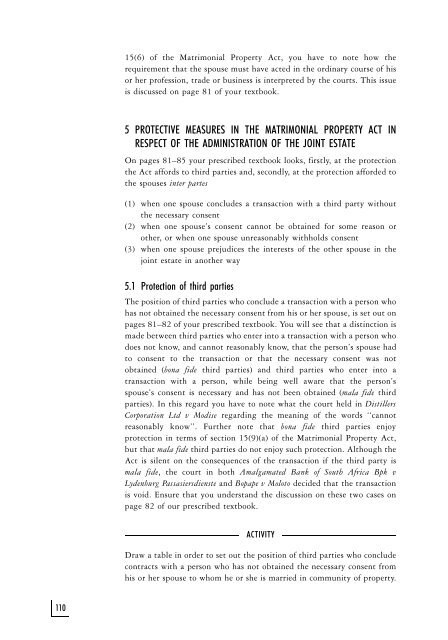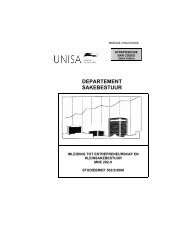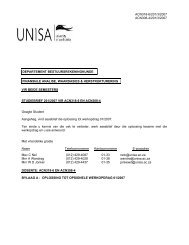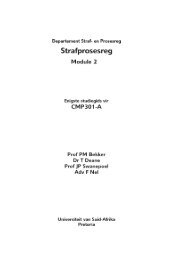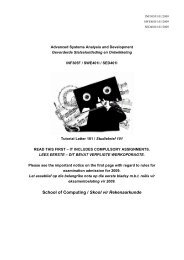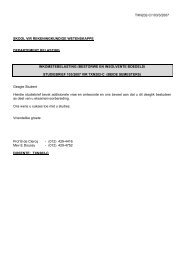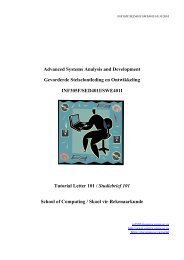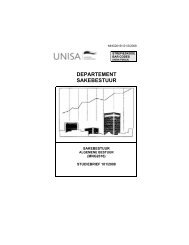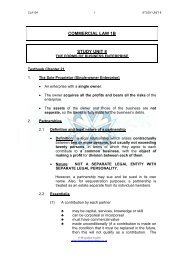key to the study guide - Name
key to the study guide - Name
key to the study guide - Name
You also want an ePaper? Increase the reach of your titles
YUMPU automatically turns print PDFs into web optimized ePapers that Google loves.
110<br />
15(6) of <strong>the</strong> Matrimonial Property Act, you have <strong>to</strong> note how <strong>the</strong><br />
requirement that <strong>the</strong> spouse must have acted in <strong>the</strong> ordinary course of his<br />
or her profession, trade or business is interpreted by <strong>the</strong> courts. This issue<br />
is discussed on page 81 of your textbook.<br />
5 PROTECTIVE MEASURES IN THE MATRIMONIAL PROPERTY ACT IN<br />
RESPECT OF THE ADMINISTRATION OF THE JOINT ESTATE<br />
On pages 81±85 your prescribed textbook looks, firstly, at <strong>the</strong> protection<br />
<strong>the</strong> Act affords <strong>to</strong> third parties and, secondly, at <strong>the</strong> protection afforded <strong>to</strong><br />
<strong>the</strong> spouses inter partes<br />
(1) when one spouse concludes a transaction with a third party without<br />
<strong>the</strong> necessary consent<br />
(2) when one spouse's consent cannot be obtained for some reason or<br />
o<strong>the</strong>r, or when one spouse unreasonably withholds consent<br />
(3) when one spouse prejudices <strong>the</strong> interests of <strong>the</strong> o<strong>the</strong>r spouse in <strong>the</strong><br />
joint estate in ano<strong>the</strong>r way<br />
5.1 Protection of third parties<br />
The position of third parties who conclude a transaction with a person who<br />
has not obtained <strong>the</strong> necessary consent from his or her spouse, is set out on<br />
pages 81±82 of your prescribed textbook. You will see that a distinction is<br />
made between third parties who enter in<strong>to</strong> a transaction with a person who<br />
does not know, and cannot reasonably know, that <strong>the</strong> person's spouse had<br />
<strong>to</strong> consent <strong>to</strong> <strong>the</strong> transaction or that <strong>the</strong> necessary consent was not<br />
obtained (bona fide third parties) and third parties who enter in<strong>to</strong> a<br />
transaction with a person, while being well aware that <strong>the</strong> person's<br />
spouse's consent is necessary and has not been obtained (mala fide third<br />
parties). In this regard you have <strong>to</strong> note what <strong>the</strong> court held in Distillers<br />
Corporation Ltd v Modise regarding <strong>the</strong> meaning of <strong>the</strong> words ``cannot<br />
reasonably know''. Fur<strong>the</strong>r note that bona fide third parties enjoy<br />
protection in terms of section 15(9)(a) of <strong>the</strong> Matrimonial Property Act,<br />
but that mala fide third parties do not enjoy such protection. Although <strong>the</strong><br />
Act is silent on <strong>the</strong> consequences of <strong>the</strong> transaction if <strong>the</strong> third party is<br />
mala fide, <strong>the</strong> court in both Amalgamated Bank of South Africa Bpk v<br />
Lydenburg Passasiersdienste and Bopape v Molo<strong>to</strong> decided that <strong>the</strong> transaction<br />
is void. Ensure that you understand <strong>the</strong> discussion on <strong>the</strong>se two cases on<br />
page 82 of our prescribed textbook.<br />
ACTIVITY<br />
Draw a table in order <strong>to</strong> set out <strong>the</strong> position of third parties who conclude<br />
contracts with a person who has not obtained <strong>the</strong> necessary consent from<br />
his or her spouse <strong>to</strong> whom he or she is married in community of property.


